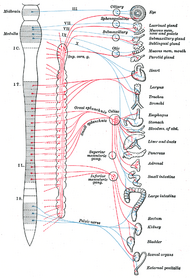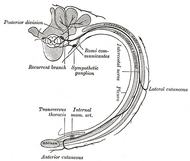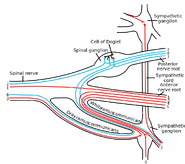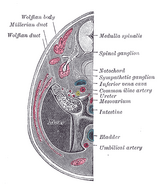Assessment |
Biopsychology |
Comparative |
Cognitive |
Developmental |
Language |
Individual differences |
Personality |
Philosophy |
Social |
Methods |
Statistics |
Clinical |
Educational |
Industrial |
Professional items |
World psychology |
Biological: Behavioural genetics · Evolutionary psychology · Neuroanatomy · Neurochemistry · Neuroendocrinology · Neuroscience · Psychoneuroimmunology · Physiological Psychology · Psychopharmacology (Index, Outline)
| Sympathetic ganglion | ||
|---|---|---|
| Autonomic nervous system innervation, showing the sympathetic and parasympathetic (craniosacral) systems, in red and blue, respectively | ||
| Latin | g. sympathicum | |
| Gray's | subject # | |
| System | ||
| MeSH | [1] | |
| Diagram of the course and branches of a typical intercostal nerve. (Sympathetic ganglion visible at center top.) | ||
Sympathetic ganglia are the ganglia of the sympathetic nervous system. They deliver information to the body about stress and impending danger, and are responsible for the familiar fight-or-flight response. They contain approximately 20000–30000 nerve cell bodies and are located close to and either side of the spinal cord in long chains.
Anatomy[]
Sympathetic chain ganglia[]
The bilaterally symmetric sympathetic chain ganglia, also called the paravertebral ganglia, are located just anterior and lateral to the spinal cord. The chain extends from the upper neck down to the coccyx, forming the unpaired coccygeal ganglion. Preganglionic nerves from the spinal cord synapse at one of the chain ganglia and the postganglionic fiber extends to an effector, typically a visceral organ in the thoracic cavity.
Collateral ganglia[]
Neurons of the collateral ganglia, also called the prevertebral ganglia, receive input from the splanchnic nerves and innervate organs of the abdominal and pelvic region. These include the celiac ganglia, superior mesenteric ganglia, and inferior mesenteric ganglia.
Additional images[]
External links[]
- The Autonomic Nervous System from the University of Arizona
- Norman/Georgetown thoraxlesson5 (paravertebralregion)
- Dictionary at eMedicine Sympathetic+ganglia
Nerves – autonomic nervous system (sympathetic nervous system/ganglion/trunks and parasympathetic nervous system/ganglion) (TA A14.3, GA 9.968) | |||||||
|---|---|---|---|---|---|---|---|
| Head/ cranial |
| ||||||
| Neck/ cervical |
| ||||||
| Chest/ thorax |
| ||||||
| Abdomen/ Lumbar |
| ||||||
| Pelvis/ sacral |
| ||||||
| {| class="navbox collapsible uncollapsed nowraplinks" style="margin:auto; " | |||||||
| |||||||
|}
| This page uses Creative Commons Licensed content from Wikipedia (view authors). |



